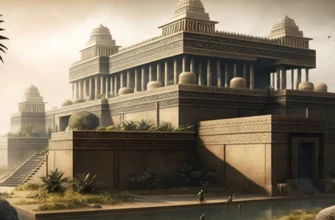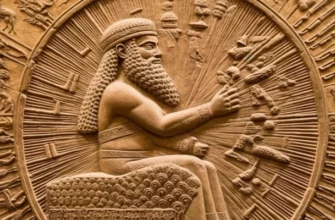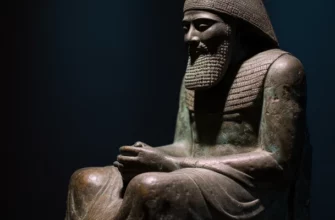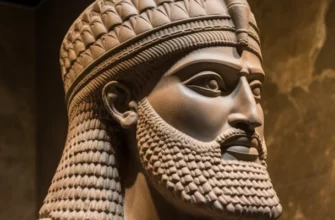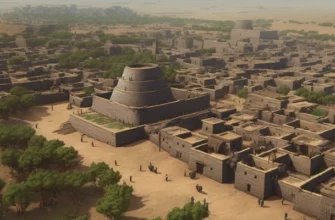Assyria was an ancient empire that existed from the 24th to the 7th century BC. It was known for its military strength, highly developed science, and culture. The Assyrians were renowned for their excellence in construction and stonework. During the reign of Ashurbanipal, Assyria became one of the largest and most influential states of its time. However, due to internal conflicts and external attacks, the empire collapsed and was finally conquered in the 7th century BC. The consequences of Assyria’s activities can still be seen today in the remains of its cities and temples, which remain in modern-day Iraq.
History of Assyria
Assyria is one of the oldest states, which existed from the 24th to the 7th century BC. It was located on the territory of modern Iraq, west of the Tigris River. Assyria reached its peak during the reign of Ashurbanipal (668-627 BC), who made it the largest state of its time.
The Assyrians were known for their military might. They possessed advanced technologies for building defensive structures and knew how to use their artillery effectively. This allowed them to carry out successful conquests, during which they gained new territories and gained control over trade routes.
In addition to its military achievements, Assyria was also known for its science and culture. The Assyrians studied astronomy, mathematics, and medicine. They had a developed writing system that allowed them to preserve and pass on knowledge from generation to generation.
Despite its achievements, Assyria experienced several crises in the 7th century BC. The empire suffered internal conflicts and was also the target of external attacks by Media, Babylonia, and other states. As a result, Assyria collapsed and its territories were divided among neighboring states.
The remains of cities and temples have survived to this day, testifying to the high level of development of Assyrian culture. A significant part of these archaeological sites have been found in modern-day Iraq.
Among the cultural achievements of Assyria, their artistic and architectural heritage is worth mentioning. The Assyrians crafted silver and gold items, as well as ceramics and wrought iron products. Temples and palaces were decorated with carved wooden doors and wall panels depicting scenes from the lives of Assyrian rulers and gods.
The influence of Assyria, its culture, and science can be seen in many aspects of the modern world. For example, the Assyrians were the first to practice state control of trade and tax collection, which became the basis for later similar systems. Also, the Assyrians were among the first to use military mechanisms, which found their embodiment in the inventions of medieval European mechanics.
Thus, Assyria left a deep mark on world history, playing a significant role in the development of culture, science, and military technology.
The military power of Assyria
The Assyrian state was famous for its military power and was one of the most influential states of its time. Assyria’s military doctrine was based on strict discipline, high motivation, and a sense of unity.
Assyria’s military potential was ensured by numerous professional troops, consisting of armed mercenaries hired from various countries, as well as its own military units. The most effective military units of Assyria were the spearmen, where each warrior was armed with a heavy shield and a long spear, and the latest military technologies, such as archery, were introduced.
The Assyrians are known for their conquests and wars. They dominated the Middle East from the 14th to the 7th centuries BC and expanded their territories by conquering and subjugating neighboring states. As a result, Assyria became the largest state of its time and had a significant influence on the politics and economy of the region.
Assyria’s military success was also ensured by its advanced arsenal of military weapons and technologies, such as catapults and assault chariots. In addition, the Assyrians developed new combat techniques, which allowed them to wage successful wars.
In the ancient world, Assyria’s military power was recognized by other states. For example, King Necho II of ancient Egypt sent an army to capture Jerusalem, which belonged to Assyria, but his army was defeated by the Assyrians at the Battle of Carchemish.
However, later, under pressure from other states, the Assyrian state declined and disappeared in the following millennium. Thus, the history of Assyria is evidence of great military power, but also of instability in the ancient world.
Science and culture of Assyria
In addition to its military power, Assyria was known for its achievements in science and culture. Assyrian scholars compiled large libraries containing a significant number of literary works covering topics such as religion, magic, astronomy, mathematics, and history.
Assyrian culture was also evident in art and architecture. Assyrian temples and palaces were decorated with works of art such as reliefs and sculptures depicting gods, people, and animals.
In addition, Assyria made a significant contribution to the development of the calendar. The Assyrian calendar is considered one of the oldest calendars in the world and was used by many peoples, including the Persians and Jews.
Thus, the science and culture of Assyria were important aspects of its history that made a significant contribution to the development of humanity.
Consequences of Assyria’s activities
Assyria – the most powerful state of antiquity activities had a significant impact on human history and left both positive and negative consequences.
The positive consequences include the development of science and culture, as well as the creation of the world’s first permanent army. The Assyrians developed new methods of military tactics and defense, which influenced the further development of military science.
The negative consequences of Assyria’s activities are associated with its imperial policy and the conquest of other peoples’ territories, which led to the destruction of many cultures and nations. In addition, Assyria’s expansion was one of the reasons for its later decline and destruction.
Thus, the consequences of Assyria’s activities are complex and ambivalent, and should be analyzed taking into account all aspects of the history of this state.

